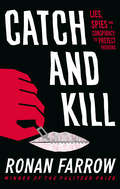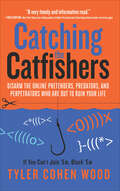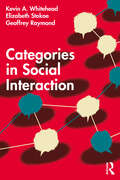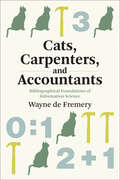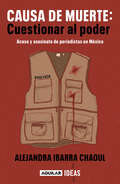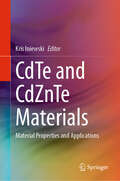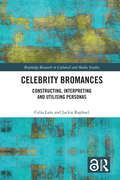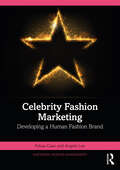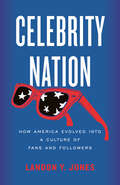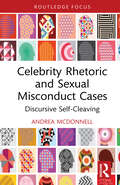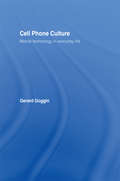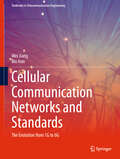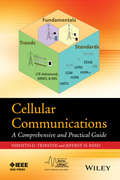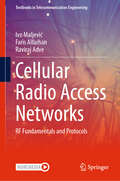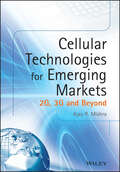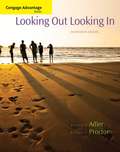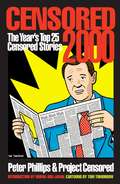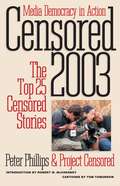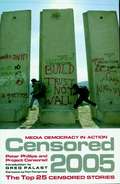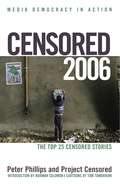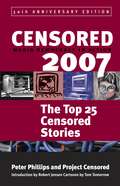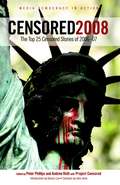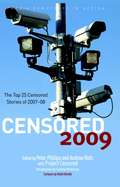- Table View
- List View
Catch and Kill: Lies, Spies and a Conspiracy to Protect Predators
by Ronan FarrowTHE NEW YORK TIMES BESTSELLER 'Riveting and often shocking' Sunday Times 'Dripping with jaw-dropping revelations' Telegraph'Absorbing' New York Times In a dramatic account of violence and espionage, Pulitzer Prize-winning investigative reporter Ronan Farrow exposes serial abusers and a cabal of powerful interests hell-bent on covering up the truth, at any cost.In 2017, a routine network television investigation led Ronan Farrow to a story only whispered about: one of Hollywood's most powerful producers was a predator, protected by fear, wealth and a conspiracy of silence. As Farrow drew closer to the truth, shadowy operatives, from high-priced lawyers to elite war-hardened spies, mounted a secret campaign of intimidation, threatening his career, following his every move and weaponizing an account of abuse in his own family. All the while, Farrow and his producer faced a degree of resistance that could not be explained - until now. And a trail of clues revealed corruption and cover-ups from Hollywood, to Washington and beyond. This is the untold story of the tactics of surveillance and intimidation deployed by wealthy and connected men to threaten journalists, evade accountability and silence victims of abuse - and it's the story of the women who risked everything to expose the truth and spark a global movement.'Darkly funny and poignant . . . a breathtakingly dogged piece of reporting' Guardian 'Reads like a thriller' The Cut 'Meticulous and devastating' Associated Press
Catching the Catfishers: Disarm the Online Pretenders, Predators, and Perpetrators Who Are Out to Ruin Your Life
by Tyler Cohen WoodLearn to protect yourself online with this comprehensive guide to safeguarding your information and identifying scams, stalkers, bullies, and more.Today, your online identity is an essential part of to your personal and professional success. But many of us don’t understand this digital Wild West and the dangers that lurk around every corner. We are often unaware of the digital “breadcrumbs” that we leave behind with every post—and how easy it is for a malicious person to use these clues to do us harm. Now cyber-security expert Tyler Cohen Wood shows you how to protect your online information and identify online threats. Catching the Catfishers is for every user of social media, teaching you how to:Safely and successfully navigate the online world.Protect yourself and your children from online predators, cyber stalkers, and chat-room bullies.Detect if someone is not who he or she claims to be.Learn what digital bread crumbs you leave behind and how to clean them up.Control your own online identity.Safely use social media for dating, business, and more.
Categories in Social Interaction
by Kevin A. Whitehead Elizabeth Stokoe Geoffrey RaymondThis book investigates the situated (re)production of categories, from the most mundane and unremarkable to those most strongly associated with power and privilege. By examining the reciprocal relationships between categorial phenomena and the basic structures and practices of social interaction, the book provides a new framework for integrating conversation analysis and membership categorization analysis.Across its ten chapters, the book describes a conversation analytic approach to studying categories and categorization, charts the development and history of membership categorization analysis, and addresses core methodological challenges and practices associated with using this approach. After mapping out the new framework developed in the book, each chapter describes intersections between categorial phenomena and the domains that comprise the infrastructure of social interaction. The book concludes by exploring applications, interventions, and impacts of understanding categories in ways examined across the preceding chapters, and by considering future avenues for excavating categorial practices in the ordinary, institutional, and technological settings of human social life.Categories in Social Interaction is essential reading for social scientists with an interest in categories of people and categorizing practices, and especially for practitioners and students of conversation analysis, membership categorization, ethnomethodology, and discursive psychology.
Cats, Carpenters, and Accountants: Bibliographical Foundations of Information Science (History and Foundations of Information Science)
by Wayne de FremeryAn expansive case for bibliography as infrastructure in information science.Cats, Carpenters, and Accountants argues that bibliography serves a foundational role within information science as infrastructure, and like all infrastructures, it needs and deserves attention. Wayne de Fremery&’s thoughtful provocation positions bibliography as a means to serve the many ends pursued by information scientists. He explains that bibliographic practices, such as enumeration and description, lie at the heart of knowledge practices and cultural endeavors, but these kinds of infrastructures are difficult to see. In this book, he reveals them and the ways that they formulate information and meaning, artificial intelligence, and human knowledge.Drawing on scholarship from areas as diverse as data science, machine learning, Korean poetry, and the history of bibliography, de Fremery makes the case for understanding bibliography as a generative mode of accounting for what has been received as data, what he calls &“carpentry-accounting.&” Referencing a well-known debate in the Anglo-American bibliographical tradition that features a willful cat, he suggests that bibliography and bibliographers are intentionally marginal figures who, paradoxically, perform foundational work in the service of the diverse disciplinary ends that formulate, however loosely, information science as a field. When we attend to the marginal but essential work of accounting for what humankind has fashioned as recorded knowledge, it becomes easier to consider the ways that human accounts can serve and, sometimes, injure us. Relevant to scholars and students from the sciences to the humanities, Cats, Carpenters, and Accountants is a highly original argument for bibliography as a marginal but foundationally powerful force shaping information science as a field and the ways that we know.
Caught in the Crossfire
by Jan GoodwinAn American journalist's experience in the war-torn Afghanistan, as a woman's magazine editor, not a combat reporter.
Causa de muerte: Acoso y asesinato de periodistas en México
by Alejandra IbarraCon esta obra Alejandra Ibarra confirma que con la muerte de estos también activistas y defensores de los ciudadanos la libertad de expresión sufre una de las mayores vejaciones. México es uno de los lugares más peligrosos en el mundo para ejercer el periodismo. En nuestro país, a muchos periodistas ocupados en la cobertura de temas locales se les hostiga, amedrenta y asesina por tomar postura sobre las injusticias que revelan, por señalar el abuso del poder y por dar voz a las inquietudes de su comunidad. Alejandra Ibarraexpone en este libro una verdad trágica que llena de dolor e indignación: a numerosos comunicadores en México no se les mata por censura, sino como una forma de castigo por incursionar en la participación política, por señalar la impunidad y corruptelas de funcionarios, alcaldes o aspirantes a gobernadores, por invitar a los ciudadanos a tomar conciencia de los engaños de funcionarios públicos y de las atrocidades del crimen organizado. Y son estos periodistas, que no tienen la atención de los grandesmedios de comunicación, a quienes nadie defiende ni se solidariza con su causa, quienes dan su vida por una sociedad mejor. El libro habla de mujeres que son emboscadas por expresar sus opiniones en radios comunitarias o ejecutadas por denunciar abusos de empresas; de reporteros que con sus propios medios y en diversas plataformas, que van del megáfono a Facebook, alertan de malos manejos de funcionarios o de alcaldesas cegadas por el poder; de periodistas que expusieron las acciones del narco olas trampas de grupos políticos y todos, sin excepción, fueron liquidados por denunciar y exigir la justa rendición de cuentas.
CdTe and CdZnTe Materials: Material Properties and Applications
by Kris IniewskiThis book provides readers with a good overview of some of most recent advances in the field of CdTe and CdZnTe detector technology for medical imaging, industrial testing and security scanning, especially as it pertains to new applications. There will be a good mixture of general chapters in both technology and applications inthe X-ray testing. The book will have an in-depth review of the research topics from leading world specialists in the field. The conversion of the X-ray and gamma-ray signal into analogue/digital value will be covered in some chapters. Some would also provide a review of CMOS chips for CdTe and CdZnTe image sensors. This book serves as an excellent reference for people already working in the field as well as for people wishing to enter it.
Celebrity Bromances: Constructing, Interpreting and Utilising Personas (Routledge Research in Cultural and Media Studies)
by Celia Lam Jackie RaphaelThis comprehensive work presents a thorough exploration of celebrity ‘bromances,’ interrogating how bromances are portrayed in media and consumed by audiences to examine themes of celebrity persona, performativity, and authenticity. The authors examine how the performance of intimate male friendships functions within broadly ‘Western’ celebrity culture from three primary perspectives: construction of persona; interactions with audiences and fans; and commodification. Case studies from film and television are used to illustrate the argument that, regardless of their authenticity (real or staged), bromances are useful for engaging audiences and creating an extension of entertainment beyond the film the actors originally sought to promote. The first truly interdisciplinary study of its kind, this book will be of great interest to scholars and students of communications, advertising, marketing, Internet studies, media, journalism, cultural studies, and film and television.
Celebrity Fashion Marketing: Developing a Human Fashion Brand (Mastering Fashion Management)
by Angela Lee Fykaa CaanThis book explores the concept of the celebrity as a 'Human Fashion Brand' and the effectiveness of the celebrity in promoting fashions and shaping the identity and decisions of fashion consumers. Beginning with an overview of the background and context of the fashion celebrity, the authors consider celebrity fashion classifications, fashion influencers, explore existing theory, models, and tools and the role of technology; and explain how celebrity-endorsed products impact on fashion consumers and trends. The book defines and develops a ‘Human Fashion Brand Model’, which describes the relationship between the fashion celebrity, fashion celebrity marketers and fashion consumer behaviour choices in celebrity fashion emulation. Coupled with reflective questions to aid learning, every chapter is illustrated by case studies of celebrities as fashion brands, as well as their impact on fashion, including Kylie Jenner and Kim Kardashian, Beyoncé, and Madonna. Providing a holistic understanding of the celebrity as a human fashion brand and celebrity-inspired fashion consumption, Celebrity Fashion Marketing should be recommended reading for advanced undergraduate and postgraduate students studying Celebrity Fashion and Influencer Marketing, Fashion Marketing, Fashion Brand Management, and Consumer Behaviour.
Celebrity Nation: How America Evolved into a Culture of Fans and Followers
by Landon JonesA former People magazine editor reveals how our cult of celebrity has shaped our politics, our culture, and our personal lives—for better or worseFrom the writer and editor who coined the term &“baby boomer&” comes Celebrity Nation, an exploration into how and why fame no longer stems only from heroic achievements but from the number of &“likes&” and shares—and what this change means for American culture. Landon Jones—who spent decades in &“celebrityland&” only to emerge, like Alice, blinking in the sunlight—brings a personal and first-person perspective on fame and its dark underbelly, complicated even further by the arrival of the internet and social media.Jones draws on his experience as the former managing editor of People magazine to bolster his account with profiles of celebrities he knew personally, ranging from Malcolm X to Princess Diana, as well as observations about contemporary social media stars like Kim Kardashian and computer-generated macro-influencer Miquela, a self-proclaimed &“19-year-old Robot living in LA.&” In analyzing the stories of over 75 celebrities, spanning decades and industries, Jones shows how celebrity has been wielded as a weapon of mass distraction to spawn narcissism, harm, and loneliness.And yet, in these stories we also see a path forward. Jones highlights luminaries like Nobel Peace prize winner Maria Ressa and lauded environmental activist Greta Thunberg, who have effected meaningful change not by glorifying themselves but by turning to their communities for action. A lively analysis of celebrity culture&’s impact on nearly every facet of our lives, Celebrity Nation helps us to recognize how the apparatus of fame operates.
Celebrity Rhetoric and Sexual Misconduct Cases: Discursive Self-Cleaving (Routledge Focus on Communication Studies)
by Andrea McDonnellThis book considers the rhetorical strategies used by celebrities and their surrogates and attorneys when faced with claims of sexual misconduct.During the past five years, a series of public figures has claimed that their celebrity persona is distinct from their “real” self as a way of eluding allegations of sexual misconduct in the courthouse and in the court of public opinion. This book examines three case studies in which such claims were employed, namely Terry Bollea/Hulk Hogan, President Donald Trump/Reality Show Host Donald Trump, and R. Kelly/Robert Kelly, to assess the mediated and legal communicative strategies used and their potential implications. Using a technique which the author calls “discursive self-cleaving,” these stars strategically craft statements on social media, in the press, and in the courtroom to create a discourse that works to shift blame away from their behavior. The book also traces the relationship between these discursive approaches and the politics of sexual violence and domestic abuse during the early months of the #MeToo movement and beyond.Providing a richly detailed analysis of how this discourse functions and why jurors and members of the public find it convincing, this book will be of interest to students and scholars in the field of communication studies, rhetoric, media, law, and popular culture studies.
Cell Phone Culture: Mobile Technology in Everyday Life
by Gerard GogginProviding the first comprehensive, accessible, and international introduction to cell phone culture and theory, this book is and clear and sophisticated overview of mobile telecommunications, putting the technology in historical and technical context. Interdisciplinary in its conceptual framework, Cell Phone Culture draws on a wide range of national, regional, and international examples, to carefully explore the new forms of consumption and use of communication and media technology that the phenomenon of mobiles represents. This fascinating biography of an important cultural object: adopts an integrated multiperspective approach considers the mobile phone and its history, production, design, consumption and representation examines the implications in contemporary media convergence such as digital photography an mobile internet. Also reflecting on the challenges and provocations of mobile phone technology and use, this is an absolute must read for any student of media studies, cultural studies or technology.
Cellular Communication Networks and Standards: The Evolution from 1G to 6G (Textbooks in Telecommunication Engineering)
by Wei Jiang Bin HanThis textbook provides a comprehensive review of the evolution of mobile communications and networking from the birth of cellular networks to the forthcoming sixth-generation mobile communications, which is envisioned to be commercially deployed first in 2030. New students who are coming to wireless communications/electrical engineering/computer networking/telecommunications and network engineering can benefit from this book by quickly grasping the whole history of cellular networks, understanding its trends. This tutorial styled textbook provides a comprehensive overview, but also provides details of the system design aspects of the various cellular generations up to 6G and how they build on each other. The book also gives the student an overview of different cellular generations’ motivations, core technologies, architecture, key performance indicators, killer applications, market drivers, and the general/main features of each. The authors capture the big picture and fundamental drivers of wireless communication technologies, and then motivate students to understand the importance of learning related subjects such as electromagnetics theory, antenna design, analog and digital circuits, signal processing, Internet protocols, artificial intelligence, etc. The book features homework questions and case studies throughout.
Cellular Communications: A Comprehensive and Practical Guide
by Jeffrey H. Reed Nishith TripathiEven as newer cellular technologies and standards emerge, many of the fundamental principles and the components of the cellular network remain the same. Presenting a simple yet comprehensive view of cellular communications technologies, Cellular Communications provides an end-to-end perspective of cellular operations, ranging from physical layer details to call set-up and from the radio network to the core network. This self-contained source forpractitioners and students represents a comprehensive survey of the fundamentals of cellular communications and the landscape of commercially deployed 2G and 3G technologies and provides a glimpse of emerging 4G technologies.
Cellular Radio Access Networks: RF Fundamentals and Protocols (Textbooks in Telecommunication Engineering)
by Ivo Maljević Faris Alfarhan Raviraj AdveThis textbook goes to the heart of telecommunications engineering by developing the underlying concepts and linking them to how system specifications are determined by standards bodies – and how systems are designed and implemented by equipment manufacturers. In this regard, the book is comprehensive in covering all important aspects of wireless networks. Tailored to undergraduate/graduate students and practicing engineers, this book presents the fundamental concepts in a concise manner, while retaining the rigor needed to truly understand wireless communications. Importantly, the book ties these developments to how these concepts are implemented in fielded systems, discussing the motivations behind the design choices made in 4G and 5G wireless communications. The book bridges the gap between theory and application, presenting key practical issues. Presents RF concepts, RAN protocols, and radio planning and optimization; Bridges the gap between theoretical and application-driven textbooks on cellular radio access networks; Includes a full suite of classroom materials including PowerPoint slides, a solutions manual, and tutorials.
Cellular Technologies for Emerging Markets: 2G, 3G and Beyond
by Ajay R. MishraIn this book, the author addresses technologies that are being used in emerging cellular markets. These include GSM/EGPRS and CDMA which are being deployed at a rapid pace, while technologies such as UMTS (3G)/ HSPA (3.5G) which have started to find a place in these high growth markets, are also considered. The book examines other technologies including LTE (3.9G) which have already moved out of research labs into the commercial world. 2G-CDMA is widely used, while further developments, e.g. CDMA2000 are also finding acceptance in the commercial arena. IMS/Convergence is increasingly popular all over the world; UMA, which is deployed mostly in North America; and DVB which is gaining worldwide popularity, especially in South Asia, are all reviewed.Each chapter discusses a different technology and is structured into three parts. The technology is examined at an overview level, first explaining what the technology is and then considering the technical features of the technology. The chapter concludes by looking at the planning/implementation aspects of the technology.Key Features:Useful for all cellular industry professionals as provides an overview of the currently deployed technologies in mass scale, and the forthcoming technologies that are expected to make an impact in the future, such as 4th Generation Cellular Networks. One of the first books on the market to encompass all the major cellular technologies, as well as considering the design and implementation perspective. Wireless Technology will play a key role in uplifting the economies of the Emerging countries globally. Ashok Chandra, Wireless Advisor to Govt. of India
Cellular Vehicle-to-Everything (Wireless Networks)
by Shanzhi Chen Yan Shi Li Zhao Hui Xu Rui Zhao Jinling Hu Jiayi FangThis book focuses on cellular Vehicle-to-Everything (C-V2X), currently the most promising wireless communication technology for Vehicle-to-Vehicle (V2V), Vehicle-to-Infrastructure (V2I), Vehicle-to-Pedestrian (V2P), Vehicle-to-Network (V2N) and Vehicle-to-Cloud (V2C) communications. Because of its low latency and high reliability, C-V2X has become an essential enabling technology for Intelligent Transportation Systems (ITSs) and autonomous driving. This book begins by introducing readers to the research background and status quo of global development. Then, after analyzing the performance requirements of various V2X applications, the system architecture and technical standards are presented. The two evolving stages of C-V2X, i.e., LTE-V2X and NR-V2X, are introduced in detail. In addition, related technologies such as mobile edge computing, network slicing and high-precision positioning, C-V2X security, C-V2X spectrum requirements and planning, and industrial development and applications are introduced. In closing, the book discusses future applications of and technical challenges for C-V2X. This book is the first monograph dedicated to C-V2X, offering experts, researchers and engineers from the areas of IT/CT, intelligent transportation, intelligent and connected vehicles (ICVs) an in-depth understanding of C-V2X technology and standards, while also outlining related interdisciplinary research. The book can also be used as a reference resource for both undergraduate and graduate studies.
Cengage Advantage Books: Looking Out, Looking In (Fourteenth Edition)
by Ronald B. Adler Russell F. Proctor IIUsed by more than a million students, LOOKING OUT/LOOKING IN, Fourteenth Edition, maintains its outstanding tradition of combining current information with a fun, reader-friendly voice that links course topics to your everyday life. You'll discover how you will benefit from improving your interpersonal skills and sharpening your critical understanding of the communication process. Diverse and compelling examples illustrate and reinforce how communication skills can affect both the world around you and your own lives. Improve your relationships and your future career success with this engaging text that teaches interpersonal concepts through popular music, art, movies, and television.
Censored 2000: The Year's Top 25 Censored Stories
by Peter Phillips Project Censored Mumia Abu-Jamal Tom TomorrowThe yearly volumes of Censored, in continuous publication since 1976 and since 1995 available through Seven Stories Press, is dedicated to the stories that ought to be top features on the nightly news, but that are missing because of media bias and self-censorship. The top stories are listed democratically in order of importance according to students, faculty, and a national panel of judges. Each of the top stories is presented at length, alongside updates from the investigative reporters who broke the stories.Beyond the Top 25 stories, additional chapters delve further into timely media topics: The Censored News and Media Analysis section provides annual updates on Junk Food News and News Abuse, Censored Déjà Vu, signs of hope in the alternative and news media, and the state of media bias and alternative coverage around the world. In the Truth Emergency section, scholars and journalists take a critical look at the US/NATO military-industrial-media empire. And in the Project Censored International section, the meaning of media democracy worldwide is explored in close association with Project Censored affiliates in universities and at media organizations all over the world.A perennial favorite of booksellers, teachers, and readers everywhere, Censored is one of the strongest life signs of our current collective desire to get the news we citizens need--despite what Big Media tells us.
Censored 2003: The Top 25 Censored Stories
by Robert W. Mcchesney Peter Phillips Project Censored Tom TomorrowThe yearly volumes of Censored, in continuous publication since 1976 and since 1995 available through Seven Stories Press, is dedicated to the stories that ought to be top features on the nightly news, but that are missing because of media bias and self-censorship. The top stories are listed democratically in order of importance according to students, faculty, and a national panel of judges. Each of the top stories is presented at length, alongside updates from the investigative reporters who broke the stories.
Censored 2005: The Top 25 Censored Stories
by Greg Palast Peter Phillips Project Censored Tom TomorrowThe yearly volumes of Censored, in continuous publication since 1976 and since 1995 available through Seven Stories Press, is dedicated to the stories that ought to be top features on the nightly news, but that are missing because of media bias and self-censorship. The top stories are listed democratically in order of importance according to students, faculty, and a national panel of judges. Each of the top stories is presented at length, alongside updates from the investigative reporters who broke the stories.
Censored 2006: The Top 25 Censored Stories
by Norman Solomon Peter Phillips Project Censored Tom TomorrowThe yearly volumes of Censored, in continuous publication since 1976 and since 1995 available through Seven Stories Press, is dedicated to the stories that ought to be top features on the nightly news, but that are missing because of media bias and self-censorship. The top stories are listed democratically in order of importance according to students, faculty, and a national panel of judges. Each of the top stories is presented at length, alongside updates from the investigative reporters who broke the stories.
Censored 2007: The Top 25 Censored Stories
by Peter Phillips Project Censored Tom Tomorrow Robert JensenThe yearly volumes of Censored, in continuous publication since 1976 and since 1995 available through Seven Stories Press, is dedicated to the stories that ought to be top features on the nightly news, but that are missing because of media bias and self-censorship. The top stories are listed democratically in order of importance according to students, faculty, and a national panel of judges. Each of the top stories is presented at length, alongside updates from the investigative reporters who broke the stories.
Censored 2008: The Top 25 Censored Stories of 2006-07
by Dennis Loo Peter Phillips Project Censored John Jonik Andrew RothThe yearly volumes of Censored, in continuous publication since 1976 and since 1995 available through Seven Stories Press, is dedicated to the stories that ought to be top features on the nightly news, but that are missing because of media bias and self-censorship. The top stories are listed democratically in order of importance according to students, faculty, and a national panel of judges. Each of the top stories is presented at length, alongside updates from the investigative reporters who broke the stories.
Censored 2009: The Top 25 Censored Stories of 2007-08
by Peter Phillips Khalil Bendib Project Censored Andrew Roth Cynthia MckinneyThe yearly volumes of Censored, in continuous publication since 1976 and since 1995 available through Seven Stories Press, is dedicated to the stories that ought to be top features on the nightly news, but that are missing because of media bias and self-censorship. The top stories are listed democratically in order of importance according to students, faculty, and a national panel of judges. Each of the top stories is presented at length, alongside updates from the investigative reporters who broke the stories.
